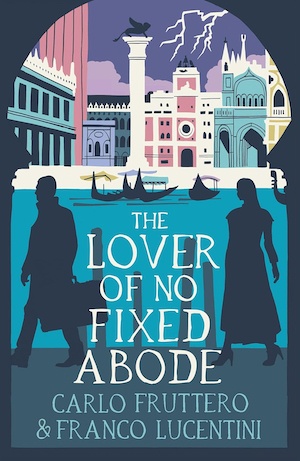Translated by Gregory Dowling — It’s surprising it has taken so long for The Lover of No Fixed Abode to appear in English. Carlo Fruttero and Franco Lucentini were highly respected Italian journalists and authors whose novels were bestsellers across Europe, a partnership that began in the 1970s and lasted until Lucentini’s death in 2002.
The premise of the novel is deceptively simple. It’s about a tryst over three intense and mysterious days in Venice in the mid-80s. A magnetic physical attraction leads to a spontaneous love affair between two unlikely partners. It all plays out against the magical and romantic backdrop of la serenissima, a city in all our heads whether we’ve been there or not – but beware: the portrait is subtly subversive.
Upon her arrival, a Roman aristocrat, businesswoman and art expert is intrigued by an enigmatic tour guide, Mr Silvera. Our unnamed narrator is on a mission to acquire paintings for a London auction house at bargain prices. She is married, surely any liaison is doomed to live only in the moment, its clandestine nature fuelling the passion. It is destined to end as a ship departs the city in just a few days.
Read our interview with translator Gregory Dowling here.
So far it sounds like a romance and it is – but this is a complex tale. The Italian princess narrates much of the story, slowly revealing as much as she learns along the way. The moment she meets Silvera, she is moved to speculate about him, imagine his world. When she finds out what he actually does, she admits she probably would have dismissed him out of hand. Tour guide is a job for a penniless student, not a man of a certain maturity. Yet he is clearly erudite and educated. Does that reveal hidden depths belying his threadbare clothing? It strikes her as incongruous.
Silvera is soon surrounded by his tourists, admiring everything from the gondolas to the pigeons, and the authors hint at the growing flood of tourism the city faces. The princess takes a private boat to her hotel on the Grand Canal. They are fated to meet again and when they do, they talk. He speaks several languages and knows this city and its art intimately. Soon they are lovers. He neglects his tourists, while she happy to divert from her disappointing search for genuine works of art; Venice is a city of forgery and deception.
The Lover of No Fixed Abode is about the deceitful shenanigans of the art world, although in truth this mystery plays second fiddle to the heart of the novel – her quest to discover the real Silvera, a contradiction that the princess can’t help falling for. That is the tension here, the reveal that we are intrigued by. Is he Jewish as his surname suggests, a spy for Mossad perhaps? There are clues throughout the story.
The lovers dominate the novel but minor characters are expertly drawn with deft thumbnail sketches too. If fiction is more about how a book makes you feel than how much you admired the plotting, this one is a winner. Honestly, I felt better about the world for having spent time in the company of the enigmatic tour guide and the mesmeric, sophisticated Roman princess.
Her narrative is perceptive and sharp, and sometimes cutting but always entertaining. This is an elegantly written novel that muses on a moment in life as much as it tells a crime story. This may be the failing for some readers; if you’re not captivated by character and style and the crime elements are all important, you will find this is light. The crime element is secondary to the Silvera enigma and the poignant love story.
We often talk of location as character and that’s more true than ever here, but what does that really mean? The authors have taken mythical and real elements of the city and laid them out for us to explore – its beguiling waterways and lagoons, narrow alleyways and its flamboyant parties, cosmopolitan character, history, festival and dark events, its uniqueness – warts and all. They capture Venice with humour and seductive language but also incisive satire. The lovers are caught up in it, so are we.
Matching the ebb and flow of the story, the narrative courses between literary dreaminess and earthy vernacular. It’s a feat of dexterity and style, of mood and emotion over plot and action. This is a classic example of the authors taking the readers on a journey and we loved it. The complexity and fluency of the narrative must have placed huge demands on translator Gregory Dowling – you can read his interview here.
Fruttero and Lucentini wrote together for decades, until Lucentini committed suicide. From newspaper and magazine articles to literary essays, they edited crime anthologies and wrote six novels together. Hopefully we will get a chance to see more in translation.
For a different view of Venice try David Hewson’s The Garden of Angels.
Bitter Lemon Press
Print/Kindle
£5.99
CFL Rating: 4 Stars
